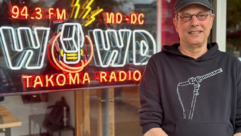BLANTYRE, Malawi — The United Nations High Commission for the Refugees (UNHCR) has launched a community radio station at Dzaleka Refugee Camp in Malawi — the first community radio in a refugee camp in Southern Africa.
Yetu, which means “ours”, is a name derived from the Swahili language, spoken among about 40,000 refugees at the camp, mainly from the Democratic Republic of Congo (DRC), Rwanda, Burundi, Ethiopia and Somalia.
COMMUNICATION
The UNHCR representative in Malawi, Monique Ekoko, said during the launch in August that the radio broadcasts would help build understanding between the refugee and host communities.

“The radio largely aims to build rapport with the refugee community through targeted news coverage, in-depth analysis and radio documentaries, phone-in programs as well as to foster communication and collaboration within the refugee community,” she said.
The broadcasts air in the six languages spoken at the camp — English, French, Swahili, Kirundi, Kinyarwanda and Malawi’s local language, Chichewa.
“Yetu Radio, educates, informs and entertains about 40,000 refugees at Dzaleka and also people from surrounding villages in Dowa district. Besides, Yetu Radio is creating a common ground for social coexistence between refugees and Malawians through educative and entertaining programs.”

Programs popular among the listeners include; “Our culture,” “Child Expressions” and “Youth Speaks”.
The establishment of the radio operation is in a response to the initiative of two former journalists, Remy Gakwaya from Rwanda and Masumbuko Ramazani, from the Democratic Republic of Congo.
CHALLENGES
With the help of the Jesuit Refugee Service the two set up a makeshift radio station in 2013, by using the microphone and loudspeakers to inform people of any development at the camp.
The speakers were placed on the roof of the community center for broadcasts and were powered by solar panels.
But this did not last long because of lack of necessary equipment and infrastructure for the broadcasts.
However, Malawi government policy does not allow refugees to be employed in the country and are not encouraged to travel outside the camp.

Chairperson for the Yetu Radio station, Raphael Maombi Ndabaga, said this is among the challenges facing workers at the station.
“Yes we are running a radio station but we don’t have all the materials. Like recorders, as we have only one. Our studio does not have a carpet; we do not have laptops to save our data,” he said. “And a major point is that the journalists are working without earning anything and this makes them feel less motivated.”
Despite some setbacks, Ekoko said UNHCR is also planning to launch another community radio station at the Luwani Refugee Camp in Neno southern Malawi, a home to more than 3,000 refugees mainly from Mozambique.










